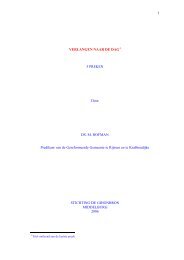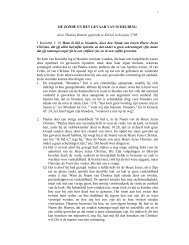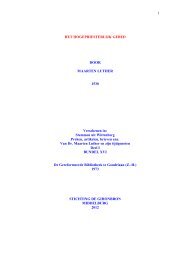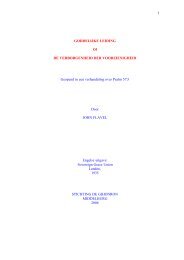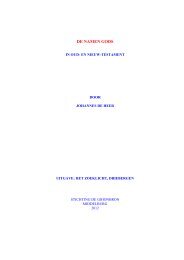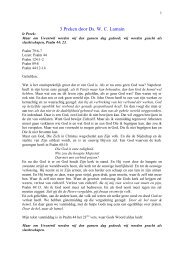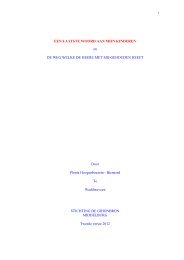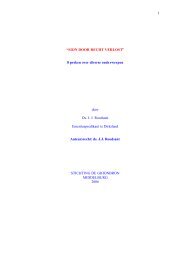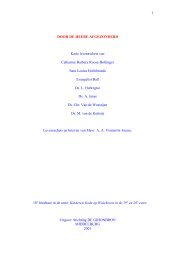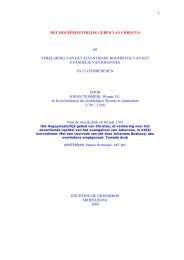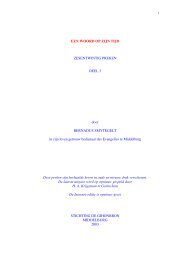melanchton 'de hoogleraar van duitsland' - Heidelberger Catechismus
melanchton 'de hoogleraar van duitsland' - Heidelberger Catechismus
melanchton 'de hoogleraar van duitsland' - Heidelberger Catechismus
You also want an ePaper? Increase the reach of your titles
YUMPU automatically turns print PDFs into web optimized ePapers that Google loves.
164<br />
deze strijd hebben."40<br />
Toen Luther gestorven was, had Calvijn twee jaar lang een moeilijke verhouding met<br />
de Zürichse theologen gehad. Het ging er daarbij om, in aansluiting bij de Ausburgse<br />
Confessie, de sacramenten niet alleen als belijdenis <strong>van</strong> de christenen te verstaan,<br />
maar meer nog als teken en getuigenis <strong>van</strong> de wil <strong>van</strong> God tegen ons. Maar toen de<br />
poging met succes bekroond was, riep een scherpe Lutherse vleugel op tot strijd tegen<br />
de avondmaalsvrede.<br />
Toen schreef Calvijn aan bisschop Thomas Cranmer in Engeland: "Wij moeten het tot<br />
het grootste ongeluk <strong>van</strong> onze eeuw rekenen, dat de kerken zo <strong>van</strong> elkaar gescheiden<br />
zijn, dat er nauwelijks een menselijke verbinding tussen ons bestaat, laat staan dat de<br />
heilige gemeenschap <strong>van</strong> de ledematen <strong>van</strong> Christus nog oprecht behouden blijft ...<br />
Dat had tot gevolg, dat het lichaam <strong>van</strong> de kerk ... voor onze ogen bloedt."41<br />
Deze klacht is echter ook een stil verlangen voor een tijd, waarin de hervormden en<br />
Luthersen weer verstaan konden worden als gemeenschappelijke broeders en zusters<br />
in de ene e<strong>van</strong>gelische kerk.<br />
Ik noem nog dit: dat, waarop Calvijn hoopte, is uiteindelijk in de 20e eeuw in<br />
vervulling gegaan in een Concordie <strong>van</strong> Luthersen, geünieerden, hervormden kerken<br />
in Europa. Als leider <strong>van</strong> een werkgroep <strong>van</strong> deze onderneming heb ik uw predikant<br />
die hier aanwezig is leren kennen. Anders was ik zelfs niet bij u in deze ruimte.<br />
40. Vgl. Eberhard Busch, Gotteserkenntnis oud Menschlichkeit. Einsichten in die Theologie<br />
Calvins, Zürich 22006, 128f. Naar de Bremense leerling Christoph Pezel beval Goltsch Luther<br />
aan de Bijbel met de woorden, waarin beide zijden "im Streit vom heiligen Abendmahl sollen<br />
zu weit gangen seyn." Volgens lectuur <strong>van</strong> het eerste en laatste deel heeft Luther over Calvin<br />
opgemerkt: "Er ist gewiss ein gelehrter vnnd frommer Mann / dem bette ich anfänglich wol<br />
dörffen die gantze Sache von diesem Streit heimstellen / Ich bekenne meinen theil," als de<br />
andere kant het ook zo vergaan was, konden we elkaar <strong>van</strong>af het begin verdragen.<br />
41. Jean Cadier, Der Mann, den Gott bezwungen hat. Zollikon 1959, 196.<br />
Summary<br />
Originally conceived as a speech for the Calvin Jubilee the first essay explores the<br />
personal relationship between Calvin and Luther. It is common knowledge that the<br />
two reformers of the first and second generation never met; the only preserved letter<br />
of Calvin to Luther, which let recognize much of Calvin's admiration for Luther, has<br />
probably not reached Luther in his lifetime. But from Calvin' s epistolary remarks<br />
about Luther we can see his high appreciation for Luther, resetting of Zwingli<br />
included, while Calvin has nothing but scorn for some of Luther's pupils.<br />
In the second part Eberhard Busch shows the proximity of the two theological<br />
Reformers based on their interpretation of Galatians, the reformatory basic text. The<br />
differences can be described as marginal and contingent, due to the difference in<br />
biographical background.<br />
In the third part the author not discreet differences in terms of understanding of law<br />
and gospel, the theological importance of the doctrine of justification and the ethical<br />
reasons. But they can not be a justification of real separation between the two<br />
directions of the Reformation. The real problem turned out to be the different<br />
interpretations of the sacrament, as they first emerged between Luther and the Swiss<br />
Reformation. Interestingly, Calvin made the Swiss responsible for this dichotomy<br />
within Protestantism. Calvin said that with a scriptural celebration of the Eucharist<br />
actually all disputes must be finished. So he saw himself as a mediator in the conflict<br />
within Protestantism, which has been overcome only recently with the Concordie of<br />
Leuenberg.



